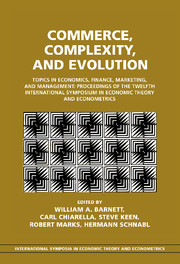 Commerce, Complexity, and Evolution
Commerce, Complexity, and Evolution Book contents
- Frontmatter
- Contents
- Series editor's preface
- Volume editors' preface
- Editors
- List of contributors
- I Philosophical and methodological implications of complexity and evolution in economic systems
- 1 Toward a generalized Coase theorem: a theory of the emergence of social and institutional structures under imperfect information
- 2 Universal Darwinism and social research: the case of economics
- 3 Uncertainty, risk, and chaos
- 4 The role of innovation in economics
- II Finance and the macroeconomy
- III Market and sectoral dynamics
- IV Marketing and interdependent behavior
2 - Universal Darwinism and social research: the case of economics
Published online by Cambridge University Press: 05 December 2011
- Frontmatter
- Contents
- Series editor's preface
- Volume editors' preface
- Editors
- List of contributors
- I Philosophical and methodological implications of complexity and evolution in economic systems
- 1 Toward a generalized Coase theorem: a theory of the emergence of social and institutional structures under imperfect information
- 2 Universal Darwinism and social research: the case of economics
- 3 Uncertainty, risk, and chaos
- 4 The role of innovation in economics
- II Finance and the macroeconomy
- III Market and sectoral dynamics
- IV Marketing and interdependent behavior
Summary
The revival of interest in evolutionary theory by economists among other social scientists is one of the most interesting developments in social science of the past 20 or more years. Hodgson's book (1993a) shows just how deep this form of theorizing is in the history of economics. He points to the current developments, but does not presume to constrain the potential directions of future development or make any explicit suggestions about theory himself.
Any reading of the literature that identifies itself as belonging to the class of theories dealing with irreversible economic change, diversity, and emergent structures indicates the vitality of the program. That there are so many inventive and pregnant ideas indicates the evolutionary nature of scientific endeavor. Examples may be cited of analytical models that yield deterministic, if path-dependent and nonergodic, predictions. Models relying on nonlinear dynamics, such as chaos models that Day (1994) or Goodwin (1990) have developed are of this kind. There are explicitly evolutionary analytical models (Metcalfe 1989, Iwai 1981) as well as the more commonly seen numerical models (Nelson and Winter 1982). Some theories are explicitly gradualist, directly following those of Darwin himself. Marshall's gradualist motto (natura nonfacit saltum) could also be that of Nelson and Winter. Others have developed theories of revolutionary or punctuated evolutionary change. Schumpeter's “creative destruction” is the paradigm case of the latter. Gersick (1991) explicitly seeks out examples of punctuated equilibrium. Gowdy (1992) focuses on the hierarchical structure of evolutionary theories.
- Type
- Chapter
- Information
- Commerce, Complexity, and EvolutionTopics in Economics, Finance, Marketing, and Management: Proceedings of the Twelfth International Symposium in Economic Theory and Econometrics, pp. 21 - 36Publisher: Cambridge University PressPrint publication year: 2000
- 1
- Cited by


